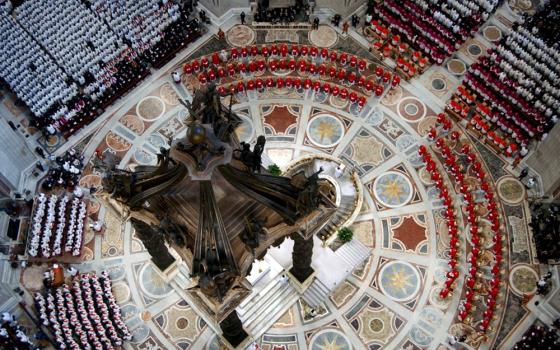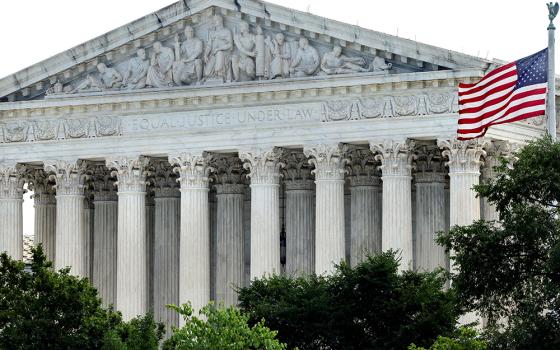It is thrilling to watch Pope Francis engage people in Rio. He seems as easy in his manner when he is walking down a red carpet in a lavish government palace with the city’s mayor as he is when he is entering the humblest of dwellings in the slum known as Vargihna. But, the ease Pope Francis exhibits in these human interactions does not appear, at least to me, to be anything learned from a PR consultant, nor even from a God-given genial demeanor, although the pope surely has that and it just as surely helps.
No, this pope’s ease amongst the powerful of the world and the poor of the world is rooted in his encounter with Jesus Christ, an encounter that led to a priestly vocation in which he has become quite comfortable bringing Christ to people by word, by sacrament, and by example. You can sense the authenticity of this man is not some mere psychological attainment: The authenticity is rooted in fidelity, in obedience, to Christ and His Church. At a time when some would-be reformers think that fidelity and obedience lead only to alienation and unhappiness, Pope Francis provides a counter-witness: For him, this fidelity and obedience have been liberating and that liberation is precisely what permits him to greet the great of the world and the small of the world as equals, and not just as equals, but as equals because each and all are equally loved by God.
Watching him kiss baby after baby from his popemobile as he drove through the shantytown on the outskirts of Rio, one could not but be reminded of Pope John Paul II’s penchant for kissing babies, his sense of the grand stage, his understanding of the drama of life. It is funny, too, to hear so many conservative commentators falling all over themselves to point out that Pope Francis’ social justice commitment is really nothing new, that what he says is the same as what Pope John Paul II said. True enough, John Paul II did frequently speak about social justice, the poor, the need for a conversion of affluent lifestyles, etc. But, these same conservatives never talked very much about it back then and there were concerted efforts to diminish the impact of Pope John Paul II’s statements in this regard, for example, Fr. Richard John Neuhaus dismissing the call to conversion of Western lifestyles in Centesimus Annus as “boilerplate” from the Vatican bureaucracy. But, hey, I love converts and I welcome my fellow Catholics who are more conservative to recognize, at long last, just how consistent the Church’s teachings are on poverty and economic justice and labor rights and all the rest!
Pope Benedict did not have the common touch that either his predecessor or successor possess, but I share the discomfort expressed by Cardinal Dolan the other day at the attempts by some to contrast Benedict and Francis in ways designed to diminish Benedict’s gifts as a person and as a pope. Anyone who took the time to read any of Benedict’s books knows that he made a remarkable contribution to theology, and, in his three volumes on Jesus of Nazareth, published during his papacy, he reminded theologians that they cannot stray too far from their data, which is Revelation, and that however sophisticated our modern methods of textual analysis or intellectual inquiry, Revelation is, by definition, miraculous, and if you rob it of that, you have taken what is divine and put it under human control, you have turned it into play-do to be manipulated by the powerful, and soon enough, the mission and ministry of a first century Jew who was born in Judea is understood as the securing of “rights” like any good, sophisticated, well-educated post-Enlightenment liberal. The willingness to denude the Christian revelation of its divinely vindicated truth, and subject it to our human categories, received a necessary check from Pope Benedict who, also unlike his predecessor and his successor, was uniquely fluent in contemporary theology so as to be able to provide such a necessary check. Similarly, the fact that Francis is not the theological heavyweight that Benedict was is in no sense a slight against Francis: It was time for a non-theologian pope. At the personal level, one would rather have a discussion about books with Benedict and go out for a drink with Francis, but both, in their different ways, brought something essential to the Petrine ministry.
What, then, unites these three pontiffs? What is the common thread for all their difference? All three brought to the papacy the gifts that God gave them, the experiences that had shaped their lives, and a sense of the moment. All three will be judged by history as to the success or failure of their pontificates: I suspect over time John Paul’s historical reputation will diminish although his official writings will remain significant; Benedict’s reputation, I fear, will be lost because of his unprecedented resignation; and it is way too soon to tell about Francis. But, what I invite Catholics to do in making these assessments is not to see which pope agreed most with your own point of view. I invite readers to see what gifts each man brought to this task and how those gifts challenged us. I put forward this invitation because you can already see people trying to claim Francis as one of their own, in some cases almost comically assessing the new pope in terms of the degree to which he agrees with this commentator or that. The process, for the Catholic, should be the other-way round: How do I let myself be challenged by the pope? What kind of conversion is he calling me to entertain? Because, if the first few days in Rio, and the first few months of this pontificate, demonstrate anything, it is this: Francis is challenging everybody. Everyone should be made uncomfortable by the clarity of what he says and the example that he shows. The Gospel is only a Gospel of consolation for the poor, and if you are reading this, on presumably a fairly expensive computer, in a nice office or home here in the States, well, you are not really poor so, for you, as for me, the Gospel is all challenge. Francis delivers this message again and again. It is what attracts. It is the idea, the possibility that the Incarnation of God as man has revealed something we moderns, for all our self-esteem, have trouble quite believing: God so loved the world that He sent His only begotten Son.
It is Pope Francis' great gift that his accessibility as a human being is so obviously rooted in Christ, it is this gift that recalls the words of the old Protestant hymn, Rock of Ages: "In my hand no price I bring, Simply to thy cross I cling." It is this gift that not only brings a young crowd of millions into the streets, but ignites their enthusiasm for the Gospel. And, what I think he has uniquely, is an ability to point beyond himself, to Christ, precisely by encouraging the Church to encounter Christ in the poor, it is this that will define his papacy in ways that are unique and, we can all hope, will sustain the sense of springtime that we all so obviously feel when we see Pope Francis walking the streets of Varginha.






